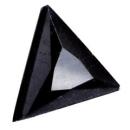|
Click on a letter above to view the list of gems. |
|
|
|
|
|
|
|
|
Freibergite
|
|
| | |
| Discovered in 1853; IMA status: Valid (pre-IMA; Grandfathered) | ||
|
| ||
|
Chemistry |
|
|
| |
|
(Ag,Cu, Fe)12(Sb, As)4S13 | |
|
|
Silver Copper Iron Antimony Sulfide |
|
Molecular Weight: |
1929.46 gm |
|
Composition: |
Iron |
3.47 % |
Fe |
|
|
|
|
Copper |
11.86 % |
Cu |
|
|
|
|
Silver |
40.25 % |
Ag | ||
|
|
Antimony |
18.93 % |
Sb | ||
|
|
Arsenic |
3.88 % |
As | ||
|
|
Sulfur |
21.60 % |
S | ||
|
|
|
100.00 % |
|
100.00 % |
= TOTAL OXIDE |
|
|
|
||||
|
Classification |
|
|
| |
|
Sulfides | |
|
2/C.11-50 | |
|
|
2 : SULFIDES and SULFOSALTS (sulfides, selenides,
tellurides; arsenides, antimonides, bismuthides; sulfarsenites,
sulfantimonites, sulfbismuthites, etc.) |
|
Related to: |
Tetrahedrite Group. Argentotennanite-Freibergite Series. Freibergite-Tetrahedrite Series. The Ag-dominant analogue of Tetrahedrite. |
|
Varieties: |
None |
|
Synonyms: |
Aphtonite, Leukargyrite, Weisgylden |
|
|
|
|
Crystal Data |
|
|
|
|
|
Tetrahedral crystals, to 3.5 cm; massive and as inclusions in other sulfides. |
|
|
None |
|
|
|
|
|
Physical Properties |
|
|
|
|
|
None |
|
|
Irregular/Uneven |
|
|
Brittle |
|
|
3.5 - 4.0; VHN100=263 - 340 kg/mm2 |
|
|
4.85 - 5.41 (g/cm3) |
|
|
None |
|
|
Not Radioactive |
|
|
|
|
|
Optical Properties |
|
|
|
|
|
Gray, Steel Gray, Black |
|
|
Opaque |
|
|
Metallic |
|
|
R: (400) 34.1, (420) 34.0, (440) 33.9, (460) 33.7, (480) 33.6, (500) 33.5, (520) 33.3, (540) 33.1, (560) 32.7, (580) 32.2, (600) 31.5, (620) 31.0, (640) 30.4, (660) 30.0, (680) 29.5, (700) 29.0 |
|
|
0.00 (opaque) |
|
|
None |
|
|
|
|
|
Occurances |
|
|
|
|
|
Geological Setting: |
In hydrothermal deposits. |
|
Common Associations: |
A wide variety of sulfides and sulfosalts, as for tetrahedrite. |
|
Common Impurities: |
Zn, Hg, Bi |
|
Type Locality: |
Reiche Zeche Mine, Himmelfahrt Mine, Freiberg, Freiberg District, Erzgebirge, Saxony, Germany |
|
Year Discovered: |
1853 |
|
View mineral photos: | |
|
|
|
|
More Information |
|
|
|
|
|
| |
|
|
|
|
Freibergite
is found at a number of localities worldwide. In
Germany, in Saxony, from the Freiberg district [TL],
as in the Himmelsfürst mine, Erbisdorf, near Freiberg.
From Kutná Hora and the Zlate Hore district, Czech
Republic. In Austria, from the Knappenstube mine, Hochtor,
Salzburg. From Yukhondzha, Sakha, Russia. At Slädekärr
and in the Vena mines, near Askersund, Örebro, Sweden.
From the Bleikvassli Zn–Pb–Cu deposit, Nordland, Norway.
In Scotland, at Tyndrum, Perthshire. In the Hi-Ho mine,
Cobalt-Gowganda region, Ontario; and the Keno Hill-Galena
Hill area, Yukon Territory, Canada. Large crystals from
the San José mine, Oruro, Bolivia. In Japan, in the
Inakuraishi, Koryu, and Sanru mines, Hokkaido. In Australia,
at Mt. Isa and the Cannington Ag–Pb–Zn deposit, Queensland;
and in the Meerschaum mine, north of Omeo, Victoria.
Additional localities are known. |
|
|
We
have not photographed our Freibergite gems. Please
check back soon. |
